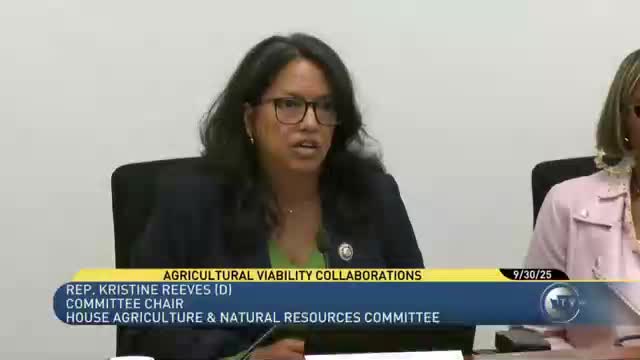Washington Agriculture Directors Present Economic Trends and Sector Challenges at Work Session
September 30, 2025 | Legislative Sessions, Washington
This article was created by AI summarizing key points discussed. AI makes mistakes, so for full details and context, please refer to the video of the full meeting. Please report any errors so we can fix them. Report an error »

In a meeting that underscored the vital role of agriculture in Washington State's economy, key figures from the Department of Agriculture and Washington State University gathered to discuss pressing issues facing the sector. The session, held on September 30, 2025, highlighted the challenges and opportunities within the state's agricultural landscape, which is a multi-billion dollar driver of economic activity.
Director Derek Sandison of the Washington State Department of Agriculture opened the discussion by providing a comprehensive overview of the agency's responsibilities. He emphasized the importance of phytosanitary inspections, food safety regulations, and the management of food assistance programs aimed at ensuring all Washingtonians have access to safe and nutritious food. Sandison noted that the department also plays a crucial role in controlling plant and animal diseases, thereby protecting the state's natural resources.
A significant concern raised during the meeting was the decline in the number of farms across Washington. According to the 2022 census, the state has seen a drop from approximately 35,700 farms in 2017 to 32,076. This trend affects farms of all sizes, with the most significant losses occurring among small farms, particularly those ranging from one to nine acres. Sandison pointed out that while Washington is known for its diverse agricultural output—growing over 300 crops, including its iconic apples—the economic landscape is increasingly challenging for smaller operations.
The statistics revealed a stark reality: 82% of farms in Washington are less than 180 acres, and the typical farm nets only about $5,000 annually. This economic disparity is further illustrated by the fact that 90% of the state's agricultural production value comes from just 10% of the farms, indicating a concentration of wealth and resources that leaves many smaller farms struggling to survive.
As the meeting progressed, the conversation shifted to the future of agriculture in Washington. The participants, including Raj Khosla, Dean of the WSU College of Agricultural, Human, and Natural Resource Sciences, are expected to explore innovative solutions to support the state's farmers and ensure the sustainability of this critical sector.
The discussions at this meeting not only shed light on the current state of agriculture in Washington but also set the stage for future initiatives aimed at revitalizing the industry. As the state grapples with these challenges, the commitment of its leaders to address the needs of farmers will be crucial in shaping a resilient agricultural future.
Director Derek Sandison of the Washington State Department of Agriculture opened the discussion by providing a comprehensive overview of the agency's responsibilities. He emphasized the importance of phytosanitary inspections, food safety regulations, and the management of food assistance programs aimed at ensuring all Washingtonians have access to safe and nutritious food. Sandison noted that the department also plays a crucial role in controlling plant and animal diseases, thereby protecting the state's natural resources.
A significant concern raised during the meeting was the decline in the number of farms across Washington. According to the 2022 census, the state has seen a drop from approximately 35,700 farms in 2017 to 32,076. This trend affects farms of all sizes, with the most significant losses occurring among small farms, particularly those ranging from one to nine acres. Sandison pointed out that while Washington is known for its diverse agricultural output—growing over 300 crops, including its iconic apples—the economic landscape is increasingly challenging for smaller operations.
The statistics revealed a stark reality: 82% of farms in Washington are less than 180 acres, and the typical farm nets only about $5,000 annually. This economic disparity is further illustrated by the fact that 90% of the state's agricultural production value comes from just 10% of the farms, indicating a concentration of wealth and resources that leaves many smaller farms struggling to survive.
As the meeting progressed, the conversation shifted to the future of agriculture in Washington. The participants, including Raj Khosla, Dean of the WSU College of Agricultural, Human, and Natural Resource Sciences, are expected to explore innovative solutions to support the state's farmers and ensure the sustainability of this critical sector.
The discussions at this meeting not only shed light on the current state of agriculture in Washington but also set the stage for future initiatives aimed at revitalizing the industry. As the state grapples with these challenges, the commitment of its leaders to address the needs of farmers will be crucial in shaping a resilient agricultural future.
View full meeting
This article is based on a recent meeting—watch the full video and explore the complete transcript for deeper insights into the discussion.
View full meeting
